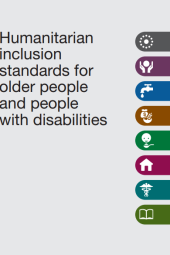Humanitarian Inclusion Standards for Older People and People with Disabilities
Summary
The Humanitarian inclusion standards for older individuals and those with disabilities aim to bridge the knowledge gap regarding the requirements, capabilities, and rights of these groups, facilitating their active participation in humanitarian endeavors. Globally, approximately 15% of the population has a disability, and around 13% are over the age of 60, with more than 46% of this older demographic experiencing a disability. Despite humanitarian principles emphasizing assistance without discrimination, there is still a lack of capacity among humanitarian organizations to fully uphold this commitment, resulting in discrimination based on disability, age, and gender that hinders the rights and participation of older individuals and people with disabilities in humanitarian efforts. The Humanitarian inclusion standards for older people and people with disabilities consist of nine Key inclusion standards, derived from the Nine Commitments of the Core Humanitarian Standard on Quality and Accountability (CHS), and seven sets of sector-specific inclusion standards: protection; water, sanitation, and hygiene; food security and livelihoods; nutrition; shelter, settlement, and household items; health; and education.
Categories:
Book
Publisher:
Age and Disability Consortium
Published Year:
2018
